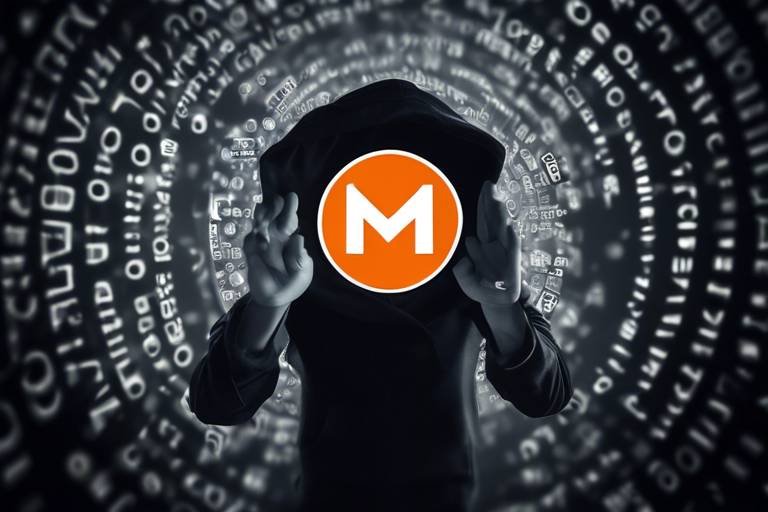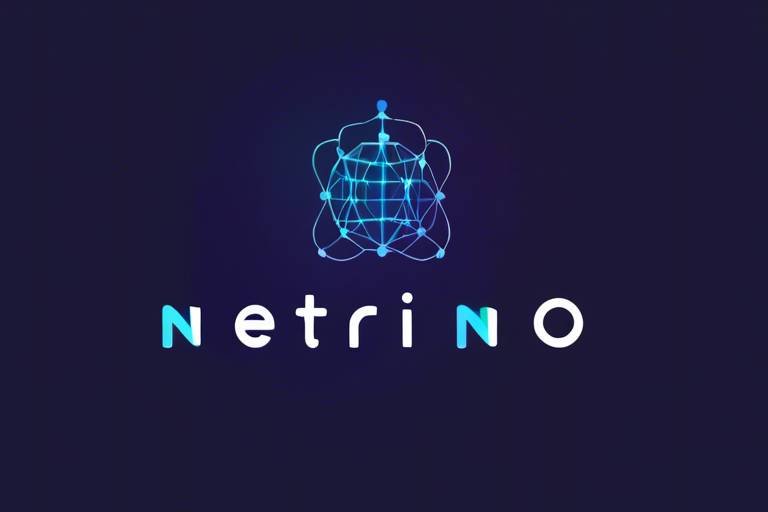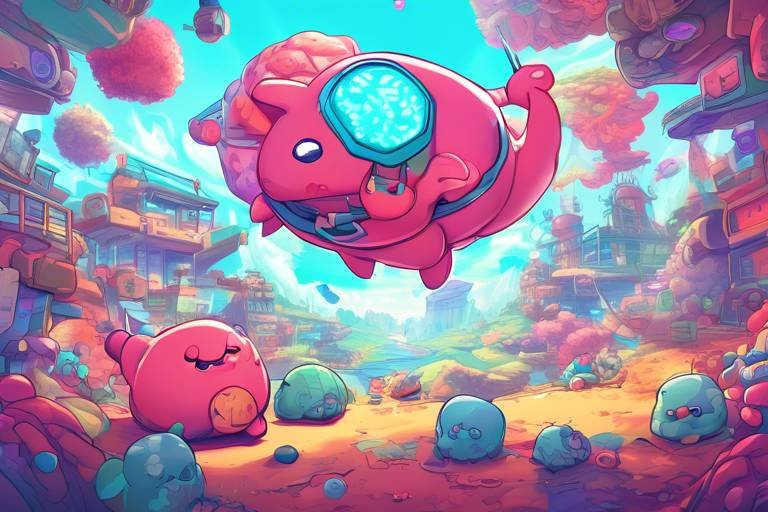Yield Guild Games - Play-to-Earn Revolution
Welcome to the future of gaming, where your skills can earn you real-world rewards! Yield Guild Games (YGG) is at the forefront of the play-to-earn revolution, transforming the traditional gaming landscape into a vibrant ecosystem where players can genuinely profit from their time and effort. Imagine a world where every quest you complete, every monster you slay, and every treasure you discover can translate into tangible benefits. This is not just a dream; it's the reality that YGG is creating. By leveraging blockchain technology, YGG empowers players to take control of their gaming experience, ensuring that they are not just passive consumers but active participants in a thriving economy.
So, what exactly is Yield Guild Games? At its core, YGG is a decentralized autonomous organization (DAO) that focuses on investing in play-to-earn games. It allows players to earn cryptocurrencies and other digital assets through gameplay, creating a new paradigm that invites both gamers and investors to join the fun. This innovative approach not only fosters community engagement but also encourages players to explore new gaming opportunities, all while building a sustainable economic model. As we delve deeper into the various aspects of YGG, you'll discover how this platform is reshaping the gaming industry and what it means for the future of play-to-earn mechanics.
The appeal of YGG lies in its ability to merge gaming with financial incentives. Players are no longer just playing for entertainment; they are playing for profit. This shift in mindset has led to an explosion of interest in games that offer real-world value. For instance, in traditional gaming, players often invest countless hours into leveling up their characters or acquiring rare items, but they see no financial return on their investment. YGG changes that narrative by allowing players to monetize their skills and time, making gaming not only enjoyable but also a viable source of income.
As we explore the intricacies of YGG, we'll examine how blockchain technology plays a pivotal role in ensuring transparency and security within the gaming ecosystem. With blockchain, players have true ownership of their in-game assets, which can be traded, sold, or used across different games. This level of ownership is revolutionary and opens up a world of possibilities for gamers. Moreover, the community-driven governance model allows players to have a say in the direction of the platform, fostering a sense of belonging and collaboration.
In essence, Yield Guild Games is not just a gaming platform; it's a movement that champions the decentralization of gaming economies. By harnessing the power of community, blockchain, and innovative economic models, YGG is paving the way for a new generation of gamers who are not only players but also stakeholders in the gaming ecosystem. As we dive deeper into this article, we will uncover the mechanics of play-to-earn, the role of blockchain in YGG, and the challenges and opportunities that lie ahead for this groundbreaking platform.

[Understanding Play-to-Earn Mechanics]
The play-to-earn model is revolutionizing the gaming industry, allowing players to earn real-world value through their in-game activities. Imagine a world where your gaming skills can translate into tangible rewards—sounds exciting, right? This innovative approach not only enhances the gaming experience but also opens up new avenues for income generation. But what exactly does it entail?
At its core, play-to-earn mechanics enable players to earn cryptocurrency or in-game assets that can be converted into real money. This model is particularly appealing in a world where traditional gaming often requires players to spend money without any return. Instead of just paying to play, players can now engage in activities that yield rewards. This shift has attracted a diverse audience, from hardcore gamers to casual players looking for new income streams.
The appeal of play-to-earn lies in its ability to create a sense of ownership and investment. Players are no longer just consumers; they become stakeholders in the gaming ecosystem. They can buy, sell, and trade their earned assets, which adds a layer of excitement and strategy to the gameplay. For example, players can earn tokens by completing quests, participating in battles, or trading items, which can then be used within the game or sold on various exchanges.
One of the key components of this model is the concept of tokenization. In many play-to-earn games, players earn tokens that represent their in-game achievements. These tokens can serve multiple purposes:
- In-game currency: Used to purchase items, upgrades, or access new features.
- Tradeable assets: Can be sold or exchanged with other players, creating a real marketplace.
- Staking opportunities: Players can stake their tokens to earn rewards over time.
This model not only incentivizes players to engage more deeply with the game but also fosters a vibrant community. Players often collaborate, forming guilds and alliances to maximize their earnings and enhance their gaming experience. The social aspect of play-to-earn games cannot be overlooked; it transforms solitary gaming into a communal activity, where players share strategies and celebrate each other's victories.
However, like any innovative system, play-to-earn mechanics come with their own set of challenges. Market volatility can impact the value of earned tokens, and players must navigate the complexities of digital assets. Additionally, the sustainability of these models is a topic of ongoing debate. Will players continue to invest time and effort if the economic landscape shifts? These questions are crucial as we look to the future of play-to-earn gaming.
In conclusion, play-to-earn mechanics represent a groundbreaking shift in how we perceive gaming. By allowing players to earn real-world value, it not only enhances their experience but also transforms gaming into a legitimate source of income. As this model continues to evolve, it will be fascinating to see how it shapes the future of the gaming industry.

[The Role of Blockchain in YGG]
When we talk about Yield Guild Games (YGG), one of the first things that come to mind is the revolutionary role of blockchain technology. But why is blockchain so crucial in this context? Well, imagine a world where players not only enjoy gaming but can also own their in-game assets, trade them freely, and earn real-world value from their virtual adventures. This is the magic that blockchain brings to YGG, and it’s changing the game—literally!
At its core, blockchain provides a decentralized and transparent ledger that records all transactions related to in-game assets. This means that players have true ownership of their digital items, unlike traditional games where assets are often controlled by the developers. With blockchain, players can buy, sell, or trade their assets without worrying about arbitrary restrictions imposed by a central authority. It's as if you’ve bought a rare collectible card; you can show it off, sell it, or trade it without asking for anyone's permission!
Furthermore, blockchain enhances the security of these transactions. Each transaction is verified by the network, making it nearly impossible to tamper with ownership records. This security is vital in building trust among players, especially in an ecosystem where real money is involved. Players can engage in the marketplace with confidence, knowing that their investments are protected.
In YGG, blockchain technology also facilitates the creation of non-fungible tokens (NFTs), which represent unique in-game assets. For example, if you acquire a rare sword in a game, that sword can be tokenized as an NFT, giving you the ability to prove ownership and transfer it to another player seamlessly. This concept of ownership and transferability is revolutionary and opens up new avenues for monetization and investment in gaming.
Let’s break down some key benefits of blockchain in YGG:
- Ownership: Players have true ownership of their assets.
- Security: Enhanced security through decentralized verification.
- Transparency: All transactions are recorded on a public ledger.
- Liquidity: Players can trade assets freely in the marketplace.
Moreover, blockchain fosters a sense of community and engagement among players. By allowing them to participate in governance through token ownership, players can have a say in the direction of the games they love. This participatory model not only empowers players but also strengthens the community, making it more vibrant and dynamic.
In summary, blockchain is not just a technical underpinning for Yield Guild Games; it’s the very foundation that transforms gaming into a play-to-earn ecosystem. With its promise of ownership, security, and community engagement, blockchain technology is paving the way for a new era in gaming. As we look to the future, it’s clear that YGG is at the forefront of this exciting revolution, harnessing the power of blockchain to create a gaming experience that is both rewarding and empowering for players worldwide.

[Token Economics Explained]
In the vibrant ecosystem of Yield Guild Games (YGG), token economics serves as the backbone that drives player engagement and overall platform sustainability. At its core, token economics refers to the way tokens are created, distributed, and utilized within the gaming environment, and it plays a crucial role in determining how players interact with the platform. Think of it as the lifeblood of the YGG universe; without it, the entire system would struggle to thrive.
YGG operates on a dual-token model, which consists of the governance token, YGG, and the in-game utility tokens associated with various games within the ecosystem. The governance token allows holders to participate in decision-making processes, influencing the future direction of the guild and its initiatives. This democratic approach not only empowers players but also fosters a sense of community ownership and responsibility.
The utility tokens, on the other hand, are integral to the gameplay experience. Players earn these tokens through various in-game activities, such as completing quests, winning battles, or participating in events. The more players engage, the more tokens they accumulate, which can then be used to unlock new features, purchase in-game assets, or even trade on external exchanges for real-world value. This creates a virtuous cycle where active participation directly correlates with tangible rewards.
| Token Type | Purpose | Utility |
|---|---|---|
| YGG Token | Governance | Voting rights on platform decisions |
| Utility Tokens | In-game rewards | Unlocking features, trading, purchasing |
Moreover, the distribution of these tokens is designed to incentivize long-term commitment. Players who hold onto their tokens are rewarded through mechanisms like staking, which allows them to earn additional tokens over time. This not only encourages players to remain active within the ecosystem but also stabilizes the token economy by reducing the likelihood of mass sell-offs.
One of the most fascinating aspects of YGG's token economics is its adaptability. As the gaming landscape evolves, so too does the utility of its tokens. For instance, new games introduced into the YGG ecosystem may come with their own unique tokens, further enriching the economic model. This flexibility ensures that players are always engaged and that the platform remains relevant in the fast-paced world of gaming.
In summary, the token economics of Yield Guild Games is a carefully crafted system that enhances player experience while ensuring the platform's sustainability. By combining governance and utility tokens, YGG creates a dynamic environment where players are not just participants but active stakeholders in the gaming ecosystem. As we look to the future, the innovative use of token economics will undoubtedly play a pivotal role in shaping the next generation of play-to-earn gaming.
- What are the main tokens used in YGG? The primary tokens are the YGG governance token and various in-game utility tokens.
- How can players earn tokens in YGG? Players can earn tokens through in-game activities such as quests and battles.
- What is the benefit of holding YGG tokens? Holding YGG tokens grants voting rights on platform decisions and potential rewards through staking.

[Incentives for Players]
In the vibrant ecosystem of Yield Guild Games (YGG), incentives play a crucial role in attracting and retaining players. The beauty of the play-to-earn model lies in its ability to transform gaming from a mere pastime into a lucrative venture. Imagine diving into your favorite game, not just for the thrill of adventure, but also for the tangible rewards that await you at every level. This shift in perspective is what makes YGG so appealing.
One of the primary incentives for players is the ability to earn real-world value through in-game activities. Whether it's completing quests, leveling up characters, or participating in battles, every action can lead to potential earnings. Players can accumulate tokens or assets that can be traded or sold, creating a genuine economic incentive to engage with the game. This is a game-changer, as it allows players to monetize their time and effort in ways that traditional gaming never could.
Furthermore, YGG has established a rewards structure that is designed to keep players motivated. For instance, players can earn bonuses for achieving specific milestones or for participating in community events. These rewards can take various forms, including:
- Exclusive NFTs: Unique digital assets that players can collect, trade, or showcase.
- Token rewards: Cryptocurrencies that can be used within the YGG ecosystem or exchanged on various platforms.
- Access to premium content: Special in-game features or early access to new games.
This layered approach to incentives not only enhances the gaming experience but also fosters a sense of community among players. When individuals see their efforts rewarded, they are more likely to engage with the community, share strategies, and even collaborate on gameplay. This sense of belonging is invaluable and contributes to a thriving ecosystem where players feel valued and invested.
Moreover, YGG has implemented a system of loyalty rewards that recognizes and appreciates long-term players. The more a player participates, the greater their rewards become, creating a virtuous cycle of engagement. This model mirrors traditional loyalty programs but is enhanced by the unique capabilities of blockchain technology, ensuring transparency and security in reward distribution.
Ultimately, the incentives offered by YGG not only motivate players to spend more time in-game but also encourage them to become advocates for the platform. As players share their experiences and successes, they attract new members, creating a self-sustaining cycle of growth and community-building. In this way, YGG is not just a platform for gaming; it's a thriving ecosystem where players can thrive, earn, and connect in ways that were previously unimaginable.

[Governance and Community Involvement]
In the world of Yield Guild Games (YGG), the power truly lies in the hands of the community. This innovative approach to governance is not just a buzzword; it’s a fundamental principle that shapes the direction of the gaming ecosystem. Imagine a gaming universe where players have a say in the decisions that affect their gaming experience—this is the reality that YGG has created. Through community involvement, players can influence everything from game selection to the allocation of resources, ensuring that the platform evolves in a way that meets the needs and desires of its users.
At the heart of this governance model is the concept of decentralization. Unlike traditional gaming companies that make unilateral decisions, YGG empowers its community to participate actively in the governance process. This is achieved through a voting system that allows players to voice their opinions and preferences. When players feel that they have a stake in the game's development, it fosters a sense of ownership and commitment that is often lacking in conventional gaming environments.
The community’s feedback is not just welcomed; it is essential. YGG has established structured channels through which players can share their thoughts and suggestions. These channels include forums, social media platforms, and community meetings. By engaging with their audience, YGG can gather valuable insights that inform their strategies and initiatives. This participatory approach not only enhances player satisfaction but also cultivates a vibrant and active community.
Another interesting aspect of YGG’s governance model is the role of community leaders. These individuals act as liaisons between the player base and the YGG team, ensuring that player voices are heard and represented. Community leaders are often seasoned players themselves, which adds an additional layer of credibility to their advocacy. They help facilitate discussions, gather feedback, and present it to the YGG team, creating a feedback loop that is crucial for continuous improvement.
Moreover, YGG has implemented a reward system that incentivizes players to participate in governance activities. Players who actively engage in voting or contribute valuable insights can earn tokens or other rewards. This not only motivates players to get involved but also aligns their interests with the overall success of the platform. When players are rewarded for their participation, it creates a win-win scenario where both the community and YGG benefit.
In conclusion, governance and community involvement are the cornerstones of Yield Guild Games. By prioritizing player input and fostering a collaborative environment, YGG is redefining what it means to be a part of a gaming community. This approach not only enhances the gaming experience but also sets a precedent for other platforms in the play-to-earn ecosystem. As YGG continues to grow, the active participation of its community will undoubtedly play a pivotal role in shaping its future.

[Game Selection and Partnerships]
When it comes to Yield Guild Games (YGG), the concept of game selection is not just a matter of picking titles that look good on the surface; it’s a meticulous process that determines the success of the entire ecosystem. YGG operates under the premise that not all games are created equal, and thus, choosing the right games is paramount. The team at YGG employs a multi-faceted approach to identify and evaluate potential games, focusing on factors like gameplay mechanics, community engagement, and, most importantly, the play-to-earn potential.
One of the key aspects of this selection process is the partnerships YGG forms with game developers. These collaborations are crucial as they not only enhance the quality of games available to players but also foster a sense of community and shared goals. YGG seeks to partner with developers who are innovative and committed to creating engaging experiences that reward players for their time and effort. This synergy between YGG and game developers leads to a more robust gaming environment, where both parties benefit from the success of the games.
In addition, YGG evaluates potential games based on their tokenomics. This means assessing how in-game currencies and assets can translate into real-world value for players. The goal is to ensure that every game within the YGG ecosystem offers players a genuine opportunity to earn, thereby enhancing the overall appeal of the platform. For example, games that incorporate unique assets, such as NFTs, are highly favored as they provide players with true ownership and the potential for long-term value.
Here's a brief overview of how YGG approaches game selection and partnerships:
| Criteria | Description |
|---|---|
| Gameplay Mechanics | Evaluating the fun and engagement level of the game. |
| Community Engagement | Assessing the existing player base and community involvement. |
| Play-to-Earn Potential | Determining the opportunities for players to earn rewards. |
| Tokenomics | Analyzing the in-game economy and asset ownership. |
Moreover, YGG's partnerships extend beyond just game developers. The organization collaborates with various platforms and services that can enhance the gaming experience. For instance, partnerships with wallet providers, NFT marketplaces, and community platforms help create a seamless ecosystem where players can easily manage their assets and engage with one another. These collaborations not only enrich the gaming experience but also contribute to a more sustainable economic model for everyone involved.
Ultimately, the combination of strategic game selection and meaningful partnerships positions YGG as a leader in the play-to-earn space. By continuously refining their approach and remaining adaptable to market changes, YGG not only attracts players but also encourages developers to innovate and push the boundaries of what’s possible in gaming. This dynamic interplay between YGG and its partners is what makes the platform a vibrant and exciting space for gamers worldwide.
- What types of games does YGG support? YGG focuses on play-to-earn games that offer real-world value through in-game activities, particularly those that incorporate NFTs and strong community engagement.
- How does YGG choose its partners? YGG selects partners based on their commitment to innovation, quality game design, and the potential for player rewards.
- Can players earn real money from YGG games? Yes, players can earn real-world value through various in-game activities, depending on the game’s tokenomics.

[Challenges Facing YGG]
Yield Guild Games (YGG) has made a significant impact in the play-to-earn gaming landscape, but like any innovative venture, it faces a myriad of challenges that could hinder its growth and sustainability. One of the primary concerns is market volatility. The cryptocurrency market is notoriously unpredictable, and fluctuations in token value can directly affect players' earnings and the overall economic stability of YGG's ecosystem. Imagine being on a rollercoaster ride where the highs can be exhilarating, but the sudden drops can leave you feeling queasy. This volatility can deter potential investors and players who seek a more stable and predictable environment.
Another pressing issue is regulatory concerns. As governments around the world begin to scrutinize cryptocurrencies and decentralized finance, YGG must navigate a complex landscape of regulations that could impact its operations. For instance, if certain jurisdictions impose strict laws on digital currencies, it could limit YGG's ability to attract new players or expand its offerings. It's akin to trying to play a game where the rules keep changing; it can be frustrating and confusing for everyone involved.
Furthermore, player retention is a crucial aspect that YGG must address. While the initial excitement of earning through gameplay can attract new players, keeping them engaged over the long term is another story. Players may lose interest if the games do not continually evolve or if the rewards do not meet their expectations. To combat this, YGG must ensure that its game offerings remain fresh and exciting. This could involve regular updates, new game releases, and community-driven events that keep players coming back for more.
In addition to these challenges, YGG also faces the issue of scalability. As the platform grows and attracts more players, the demand on its infrastructure will increase. YGG must invest in robust technology to ensure that it can handle a larger user base without sacrificing performance. If the platform experiences downtime or slow performance, it could lead to frustration and loss of trust among players.
| Challenge | Description |
|---|---|
| Market Volatility | Fluctuations in token value affecting player earnings and ecosystem stability. |
| Regulatory Concerns | Scrutiny from governments impacting operations and player attraction. |
| Player Retention | Keeping players engaged over time amidst evolving interests. |
| Scalability | Ensuring infrastructure can handle increased demand from a growing user base. |
In conclusion, while YGG is at the forefront of the play-to-earn revolution, it must navigate these challenges carefully. By addressing market volatility, regulatory issues, player retention, and scalability, YGG can continue to thrive and redefine the gaming experience for its community. The path ahead may be fraught with obstacles, but with innovation and community support, YGG has the potential to overcome these hurdles and lead the charge in decentralized gaming.
- What is Yield Guild Games? YGG is a decentralized gaming community that allows players to earn real-world value through play-to-earn mechanics.
- How does YGG address market volatility? YGG is exploring various strategies to stabilize its economic model and provide players with a more predictable earning experience.
- What games does YGG offer? YGG partners with various game developers to provide a diverse range of play-to-earn games.
- How can players get involved with YGG? Players can join YGG by participating in its community, playing partnered games, and contributing to governance decisions.

[Sustainability of the Model]
The sustainability of Yield Guild Games (YGG) is a topic that stirs interest among gamers and investors alike. As the play-to-earn model grows in popularity, ensuring that it remains viable in the long run is essential. But what does sustainability really mean in the context of YGG? It's about creating a balance between economic incentives for players and the overall health of the ecosystem. If players are earning rewards, it’s crucial that these rewards are not just temporary but are supported by a robust economic framework.
One of the cornerstones of YGG's sustainability is its unique economic model. By incorporating blockchain technology, YGG ensures that players have true ownership of their in-game assets. This ownership is not just a buzzword; it translates into real-world value that can be traded or sold. Imagine having a digital asset that you can carry with you from one game to another, or even sell for cash. This creates a compelling reason for players to invest time and effort into the games offered by YGG.
Moreover, YGG employs several strategies to maintain player engagement and profitability. For instance, the platform regularly updates its game offerings and partnerships, ensuring a diverse range of experiences that keep players coming back for more. This adaptability is crucial in a fast-paced gaming environment where trends can shift overnight. The ability to pivot and introduce new games or features helps keep the community vibrant and engaged.
In addition to game selection, YGG has developed a rewards structure that incentivizes long-term participation. Players can earn tokens not just for playing games but also for contributing to the community, such as providing feedback or helping new players. This creates a sense of belonging and encourages players to invest in the ecosystem. The more players feel they are part of something larger, the more likely they are to remain active participants.
However, sustainability is not without its challenges. The volatility of the cryptocurrency market can pose risks to the economic model. If the value of tokens fluctuates wildly, it can impact player earnings and, consequently, their willingness to engage with the platform. To combat this, YGG is exploring various mechanisms to stabilize token value, such as staking options and liquidity pools, which can help mitigate drastic price changes.
Ultimately, the sustainability of YGG hinges on its ability to adapt to changing market conditions while maintaining a strong community. By focusing on player engagement, economic stability, and continuous innovation, YGG aims to create a gaming ecosystem that is not just profitable but also rewarding for players. As the play-to-earn landscape evolves, YGG's commitment to sustainability will be a key factor in its long-term success.
- What is Yield Guild Games? - Yield Guild Games is a decentralized gaming community that allows players to earn real-world value through play-to-earn mechanics.
- How does YGG ensure sustainability? - YGG focuses on a robust economic model, diverse game offerings, and community engagement to maintain sustainability.
- What role does blockchain play in YGG? - Blockchain technology provides transparency, security, and true ownership of in-game assets, enhancing the overall gaming experience.
- Are there risks associated with YGG? - Yes, market volatility and regulatory concerns are potential risks that could impact YGG's growth and player retention.

[Future Trends in Play-to-Earn Gaming]
The world of play-to-earn gaming is not just a passing trend; it's a revolutionary shift that is reshaping how we perceive gaming and its economic implications. As we look ahead, several exciting trends are emerging that could redefine the landscape of Yield Guild Games (YGG) and similar platforms. One significant trend is the increasing integration of non-fungible tokens (NFTs) into gameplay. NFTs allow players to truly own their in-game assets, giving them the ability to trade, sell, or use these items across different games. Imagine a sword you earned in one game being usable in another—this kind of interoperability could create a vibrant marketplace and enhance player engagement.
Moreover, we can expect advancements in decentralized finance (DeFi) mechanisms within play-to-earn ecosystems. This integration could lead to innovative financial products tailored for gamers, such as staking rewards for in-game assets or lending platforms where players can borrow against their NFTs. This not only enhances the economic viability of the gaming experience but also provides players with more ways to generate income. Furthermore, as blockchain technology continues to evolve, we may see improvements in scalability and transaction speeds, making gaming experiences smoother and more enjoyable.
Another trend to keep an eye on is the rise of community-driven game development. With platforms like YGG emphasizing community governance, players will have more say in the types of games that are developed and the features they want to see. This democratization of game development could lead to unique, player-centric games that resonate more with the audience. Imagine being able to vote on game mechanics or storyline elements—this level of involvement can create a stronger bond between players and developers, ultimately enhancing the gaming experience.
As we dive deeper into the future, the concept of cross-platform gaming will likely gain traction. Players are no longer confined to traditional gaming consoles or computers; mobile gaming is booming, and the demand for seamless experiences across devices is at an all-time high. YGG and similar platforms will need to adapt by ensuring their games are accessible on various platforms, allowing players to earn regardless of where they are or what device they use.
Lastly, we cannot overlook the importance of regulatory developments surrounding cryptocurrency and gaming. As governments and regulatory bodies begin to establish clearer guidelines, the legitimacy of play-to-earn models will likely increase, attracting more mainstream players and investors. This could lead to a more stable market environment, allowing YGG to thrive and expand its offerings.
In summary, the future of play-to-earn gaming is bright and full of potential. With advancements in technology, community involvement, and regulatory clarity, platforms like YGG are poised to lead the charge in this exciting new frontier. The opportunities for players to earn while enjoying their favorite games will continue to grow, making gaming not just a pastime, but a viable economic activity.
- What is play-to-earn gaming? Play-to-earn gaming allows players to earn real-world value through in-game activities, such as completing tasks, winning battles, or trading assets.
- How does blockchain technology benefit YGG? Blockchain provides transparency, security, and true ownership of in-game assets, enhancing the overall gaming experience.
- What are NFTs, and why are they important? NFTs are unique digital assets that players can own, trade, and use across different games, creating a sense of ownership and value.
- Will play-to-earn gaming become mainstream? With the increasing interest from investors and advancements in technology, play-to-earn gaming is on a trajectory toward mainstream acceptance.

[Conclusion: The Future of YGG]
As we navigate the ever-evolving landscape of gaming, Yield Guild Games (YGG) stands at the forefront of a transformative movement that is reshaping how we perceive and engage with digital entertainment. The play-to-earn model has not only revolutionized the way players interact with games but has also introduced a new economic paradigm that empowers gamers to reap tangible rewards for their time and effort. With its innovative approach, YGG is paving the way for a future where gaming is not just a pastime but a viable source of income.
The potential for decentralized gaming economies is immense, and YGG is uniquely positioned to capitalize on this trend. By leveraging blockchain technology, the platform ensures a level of transparency and security that traditional gaming models simply cannot provide. This trust is essential for building a loyal community, and YGG's commitment to player ownership fosters a sense of belonging and investment among its users.
Looking ahead, YGG's future is bright, but it is not without challenges. The gaming world is rife with uncertainties such as market volatility and regulatory hurdles that could impact its growth trajectory. However, the resilience of the community and the adaptability of the platform are key factors that will determine its sustainability. YGG's ability to innovate and respond to player feedback will be crucial in maintaining engagement and ensuring that the ecosystem thrives.
Moreover, as the gaming industry continues to evolve, we can expect to see exciting trends emerge within the play-to-earn space. New technologies, immersive experiences, and enhanced game mechanics will likely redefine the gaming experience, making it even more appealing to both casual and hardcore gamers alike. YGG's strategic partnerships and game selection will play a pivotal role in shaping these developments, allowing it to remain a leader in the industry.
In conclusion, Yield Guild Games is not just a passing trend; it represents a significant shift in the gaming landscape. With its innovative approach and strong community focus, YGG has the potential to redefine the gaming experience for players around the globe. As we look to the future, it will be fascinating to witness how YGG continues to evolve and inspire new generations of gamers to embrace the play-to-earn revolution.
- What is Yield Guild Games (YGG)?
YGG is a decentralized gaming community that allows players to earn real-world value through play-to-earn mechanics. - How does the play-to-earn model work?
Players can earn tokens or in-game assets that have real monetary value by participating in various games within the YGG ecosystem. - What role does blockchain play in YGG?
Blockchain technology ensures transparency, security, and true ownership of in-game assets, enhancing the overall player experience. - What are the incentives for players in YGG?
YGG offers various rewards, including token distributions and unique in-game assets, motivating players to engage and invest time in the platform. - How does community governance work in YGG?
Players have a voice in decision-making processes, influencing the direction and development of the gaming ecosystem through feedback and voting.
Frequently Asked Questions
- What is Yield Guild Games (YGG)?
Yield Guild Games (YGG) is a decentralized gaming community that allows players to earn real-world value through play-to-earn mechanics. By leveraging blockchain technology, YGG creates an ecosystem where players can own, trade, and earn from in-game assets.
- How do play-to-earn mechanics work?
Play-to-earn mechanics enable players to earn cryptocurrency or other assets by participating in games. Players can complete tasks, achieve milestones, or engage in battles, all while accumulating rewards that have real-world value.
- What role does blockchain play in YGG?
Blockchain technology provides transparency, security, and true ownership of in-game assets. It ensures that players have control over their earnings and that transactions are secure, fostering trust within the community.
- What are token economics in YGG?
Token economics refers to how tokens are utilized within the YGG ecosystem. Tokens can be used for governance, rewards, and trading, influencing player engagement and the overall health of the gaming economy.
- Are there incentives for players in YGG?
Yes! YGG offers various incentives such as rewards for gameplay, staking opportunities, and participation in governance decisions. These incentives encourage players to invest time and effort into the games.
- How does community governance work?
Community governance allows players to have a say in decision-making processes within YGG. Player feedback and votes can influence game selection, economic policies, and overall direction, making the community an integral part of the ecosystem.
- What challenges does YGG face?
YGG encounters challenges such as market volatility, regulatory issues, and maintaining player retention. Addressing these challenges is crucial for the platform's growth and sustainability in the play-to-earn landscape.
- How sustainable is the YGG model?
Sustainability is key for YGG's longevity. The platform employs various strategies, including diversifying game offerings and ensuring a healthy economic model, to keep players engaged and profitable over time.
- What are the future trends in play-to-earn gaming?
The play-to-earn landscape is evolving rapidly, with trends such as increased integration of virtual reality, enhanced player experiences, and more robust economic systems expected to shape the future of YGG and the broader gaming industry.
- What is the future of Yield Guild Games?
The future of YGG looks promising as it continues to innovate and adapt to the changing gaming environment. With a strong community and a focus on sustainability, YGG is poised to redefine the gaming experience for players worldwide.



















